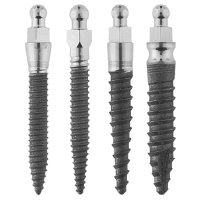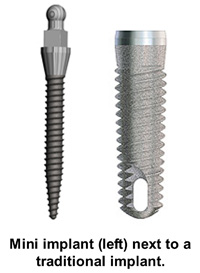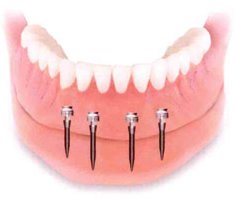Mini Dental Implants (MDI)

What are Mini Dental Implants (MDI)
Mini dental implants (MDI) are one of the major developments in the technology of dentistry, mainly used for denture stabilization. Many dentists offer mini dental implants as a lower cost alternative to their patients, whenever the case requirements permit their use. Market researches show that they become increasingly popular and several techniques are developed based on their use.
In this Article:
What is Different with Mini Dental Implants?
 Mini dental implants were first introduced in the mid 1980's but they became accepted by FDA as long term devices in 1999
and found immediate success within the dental community providing new solutions for denture stabilization.
Today they represent one of the fastest growing segments of the dental product industry.
Mini dental implants were first introduced in the mid 1980's but they became accepted by FDA as long term devices in 1999
and found immediate success within the dental community providing new solutions for denture stabilization.
Today they represent one of the fastest growing segments of the dental product industry.
A mini dental implant (MDI) is actually a narrower type titanium screw with a diameter of about 1.8-2.9 mm instead of 4.0-5.5mm.
Other main differences between mini and conventional dental implants are:
- Solid structure. Mini dental implants are made from the same materials (titanium alloy) but they are solid and not hollow as the conventional type.
- Single piece. They are made in one piece while a conventional one consists of two parts, the fixture and the abutment. Unlike standard implants that are placed under the gums, MDIs protrude over the gum surface when they are placed into the bone.
- Single stage placement. Their placement procedure is a single stage process as compared with the standard 2-stages process.
How Mini Dental Implants work?
 The mini dental implant consists of a 1 piece titanium screw with a ball shaped head on top of it instead of the classic abutment.
Their ball shaped head "snaps" into socket-like connectors into the base of the denture which rests gently on the gum tissue.
The mini dental implant consists of a 1 piece titanium screw with a ball shaped head on top of it instead of the classic abutment.
Their ball shaped head "snaps" into socket-like connectors into the base of the denture which rests gently on the gum tissue.
The denture stabilization is achieved using a rubber o-ring inside the socket connector, providing adequate retaining force to hold the dentures in place while eating or talking. The connection can be forced open by applying a bit more force, enabling the removal of the dentures. Patients can put in place and remove their mini implants' retained denture easily after a little practice.
Unlike standard implants, they allow immediate loading without waiting months for the osseointegration to be completed. After the surgery appointment, the patient can walk out of the dental office with a lower denture which is not only solidly stable, but can be used to eat immediately.
How Much Mini Dental Implants Cost?
The average price of mini dental implants can range from $500 to $1200 per tooth, about 60-70% lower cost than that of conventional ones,which explains why their usage has increased lately. The main reason for this difference is the much lower cost of procedure and materials for the dentists, who can pass some of these savings to the prices offered to their patients.
Average cost of stabilizing a lower denture with mini implants
 An average price for stabilizing a lower denture with 4 to 6 mini implants and retrofitting an existing lower denture is about $2000-$5000.
If your existing denture can not be adjusted, you should add the cost of a new denture.
An average price for stabilizing a lower denture with 4 to 6 mini implants and retrofitting an existing lower denture is about $2000-$5000.
If your existing denture can not be adjusted, you should add the cost of a new denture.
Mini dental implants provide a cheap remedy for loose dentures, with a high degree of success when used for the stabilization of full and partial dentures, especially for the lower jaw.
Why Mini Dental Implants are cheaper?
Mini dental implants cost less mainly because of the following reasons:
- faster procedure - they are placed in one stage and allow immediate loading, which saves valuable office time for the dentist
- simpler procedure - the surgical procedure is simpler, without the need of specially trained staff or special equipment
- lower material cost - the actual manufacturer material cost is much less for MDIs
- lower training cost - due the simplicity of the procedure, their placement doesn't require the same costly learning and training as conventional implants.
Advantages of Mini Dental Implants
At one third of the price of standard implants, many refer to MDIs as 'the cheap dental implants'. But that is not their only advantage:
- The placement procedure is much faster. Mini dental implants allow immediate loading, so the procedure can be completed in a few hours and the patient can return home with fully functional implant retained dentures, without waiting several months for osseointegration. For this reason many professionals refer to MDIs as single-day implants.
- The surgical part of the procedure is much simpler, due to the smaller diameter screw. Less or no incision of the gums is needed, much smaller hole has to be drilled in the bone.
- The implant surgery is much less invasive therefore there are less chances for surgical errors such as damage to nerves or sinuses. Even if such a condition occurs, it can be corrected much easier due to the smaller size of damaged area.
- Post surgical complications (pain, bleeding, trauma) are very limited.
- Small diameter implants can be placed in jaw areas without enough jawbone width, where the standard width type can not be placed without the need for bone grafting.
- They offer a simpler solution that is less technically demanding allowing more dental professionals to be able to offer implant treatment to their patients.
- Many implant dentists now prefer the use of MDIs, when possible, over standard the standard width type due to the simplicity of the procedure, the smaller risks involved and the less requirements in terms of learning and experience.
- Mini dental implants cost is up to 60-70% less due to the simpler and faster procedure and the lower material costs. They can offer a low cost solution for those seeking for an affordable alternative.
- Already existing dentures may be adjusted for use with MDIs.
Risks - Restrictions of Mini Dental Implants
Mini dental implants can not be used in every case. Some restrictions apply, which when violated may cause implant failures.
- Mini dental implants are approved by FDA only for lower jaw denture stabilization. They are not yet FDA approved as substitutes of standard implants in other cases.
- Several MDIs are needed for denture stabilization. The minimum for the lower jaw is 4 mini implants when only 2 are needed if the standard width type are used.
- MDIs do not perform as well in the upper jaw which has usually less bone density. If they have to be used for upper jaw, a larger number is needed (10-12 MDIs).
- They are single piece devices. If their ball head wears off after some years the whole implant has to be extracted and replaced, while with conventional ones only the abutment has to be replaced.
- There is no guarantee to the longevity of mini implants. It still depends on functional load and how your bone reacts to its existence.
Where Mini Dental Implants are used?
Mini dental implants were initially designed to be used only as denture implants for lower jaw denture stabilization, in order to act as a retaining fixture to hold the denture in place.
Thanks to the high success rates and the ease of their placement procedure many dentists have started to use MDIs also for the replacement of small teeth such as incisors where the forces applied are not too big. Due to their smaller dimensions they also are used in cases where the available space is too narrow for a conventional dental implant.
next page -> Implant Supported Dentures | What are Denture Implants?



